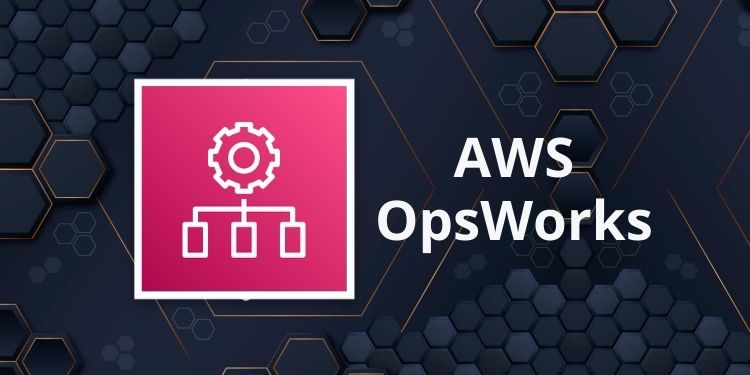AWS OpsWorks
Please use the menu below to navigate the article sections:

AWS OpsWorks is a configuration management service that provides managed instances of these two open-source tools (Chef and Puppet).
With OpsWorks AWS manage and automate how your infrastructure configured, deployed, and managed.
The difference between AWS OpsWorks for Chef and Puppet is that Chef works with AWS OpsWorks Chef cookbooks and recipes, while AWS OpsWorks for Puppet Enterprise works with manifests and modules.
Recipes and manifests, as a rule, describe single concepts, while cookbooks and recipes describe more general concepts.
AWS OpsWorks monitoring consists of a direct integration between AWS OpsWorks and CloudWatch.
AWS OpsWorks Logs for use and access of the service are natively and securely shipped to AWS CloudTrail.
AWS OpsWorks Stacks
AWS OpsWorks Stacks is a configuration management service within the wider OpsWorks AWS tooling that enables you to automate any tasks within your environment.
AWS OpsWorks Auto Healing for OpsWorks Stacks also allows your environments to be automatically healed to ensure your environments are proactively healthy.
A good example of these tasks may be things like scaling up and down, setting up of your database clusters, and installing packages and dependencies within your virtual machines.
Linux and Windows workloads are supported by OpsWorks stacks, and it uses Chef Recipes to configure the sorts of tasks which are best suited to being automated.
Every OpsWorks stack is built of multiple layers – each representing a different stack component, such as an individual load balancer, a database, or a set of EC2 instances.
There are number of features of AWS OpsWorks Stacks:
- EC2 instances can be deployed using template configurations, including EBS volumes.
- The software on your instances can be configured on-demand or automatically based on events that occur over time, from bootstrapping a base OS image into a running server to modifying running services to reflect changes.
- Stacks can be automatically healed by the AWS OpsWorks service. OpsWorks Stacks can replace a failed instance in your stack with a new one, ensuring maximum uptime and availability
- AWS OpsWorks Stacks integrates perfectly with Amazon CloudTrail and send logs to the CloudTrail console without having to configure this yourself.
AWS OpsWorks for Chef Automate
Chef Automate is an enterprise level-platform that provides actionable insights with enterprise scale and performance across your cloud architecture.
AWS OpsWorks for Chef Automate is a managed way of launching a Chef Automate server in OpsWorks AWS.
Within AWS, you can run a Chef Automate server without having to worry about provisioning any hardware.
AWS OpsWorks Auto Healing for Chef Automate also allows your environments to be automatically healed to ensure your environments are proactively healthy.
Chef Automate handles its own operations, backups, restorations, and software upgrades also.
You can connect any on-premises computer or any EC2 instance that is running a supported operating system (list here) which has network access to an AWS OpsWorks for Chef Automate server.
You can configure automatic backups natively, and the backups are stored in S3.
Adding new nodes to your Chef server is as simple as inserting the user-data code provided by OpsWorks for Chef Automate into your Auto Scaling groups.
All Chef communication is encrypted using SSL to ensure that the server will communicate safely and securely with other aspects of your architecture.
You receive the full Chef Automate platform which includes premium features that you can use with Chef server, like Chef Workflow, Chef Visibility, and Chef Compliance, all within the same service.
OpsWorks for Chef Automate can also install updates automatically during a weekly maintenance window, one which you define.
You can launch a Chef Automate server through the console, using CloudFormation, or using the CLI or the SDK.
AWS OpsWorks for Puppet Enterprise
OpsWorks for Puppet Enterprise is another subset of OpsWorks which lets you launch a Puppet Enterprise master in minutes, compared to hours.
You can configure automatic backups natively, and the backups are stored in S3.
Adding new nodes to your Puppet Enterprise server is as simple as inserting the user-data code provided by AWS OpsWorks for Puppet Enterprise into your Auto Scaling groups.
Puppet Enterprise communication is encrypted using SSL to ensure that the server will communicate safely and securely with other aspects of your architecture.
Deleting a Puppet Enterprise server will also delete everything associated with it, including backups and all other supporting resources.
AWS OpsWorks for Puppet Enterprise can also install updates automatically during a weekly maintenance window, one which you define.
You can launch a Puppet Enterprise server through the console, using CloudFormation, or using the CLI or the SDK.
AWS OpsWorks Pricing
For OpsWorks Stacks, there is no additional charge. You pay for any resources you launch as part of the service, but nothing for OpsWorks Stacks.
On-premises deployments of OpsWorks stacks cost $0.02 per hour and with both deployments there are no minimum fees and no upfront commitments.
AWS OpsWorks for Chef Automate and for Puppet Enterprise are charged separately.
You are charged based on the number of nodes connected to your Chef Automate instance the times they are running for and the EC2 instance which is running.
The final price considers the number of nodes per month, and the number of node hours.
For both OpsWorks Puppet Enterprise and Chef Automate you benefit from 7,500 node hours free per month with the AWS Free Tier.
OpsWorks AWS Endpoints and Quotas
OpsWorks for Chef Automate and AWS OpsWorks for Puppet Enterprise isn’t currently available in all Regions – and only exists in nine regions currently (list here.)
OpsWorks Stacks exists in fifteen regions instead, and any resources cannot be managed from other regions.
Please see the table below for information on the service quotas for AWS OpsWorks stacks.
|
Name |
Description |
Default Limit (Per Region) |
Hard / Soft Limit |
|
Stacks |
Number of Stacks |
40 |
Soft |
|
Layers per Stack |
Multiple different stack components, such as an individual load balancer, a database, or a set of EC2 instances. |
40 |
Soft |
|
Instances per Stack |
The maximum number of instances that you can have in an OpsWorks stack. |
40 |
Soft |
|
Apps per Stack |
The maximum number of apps that you can have in an OpsWorks stack. |
40 |
Soft |
Please see the table below for information on the service quotas for OpsWorks for Chef Automate and AWS OpsWorks for Puppet Enterprise.
|
Name |
Default Limit (Per Region) |
Hard / Soft Limit |
|
Manual backups per server |
10 |
Soft |
|
Number of scheduled (automated) backups per server |
10 |
Soft |
|
Number of servers |
5 |
Soft |




